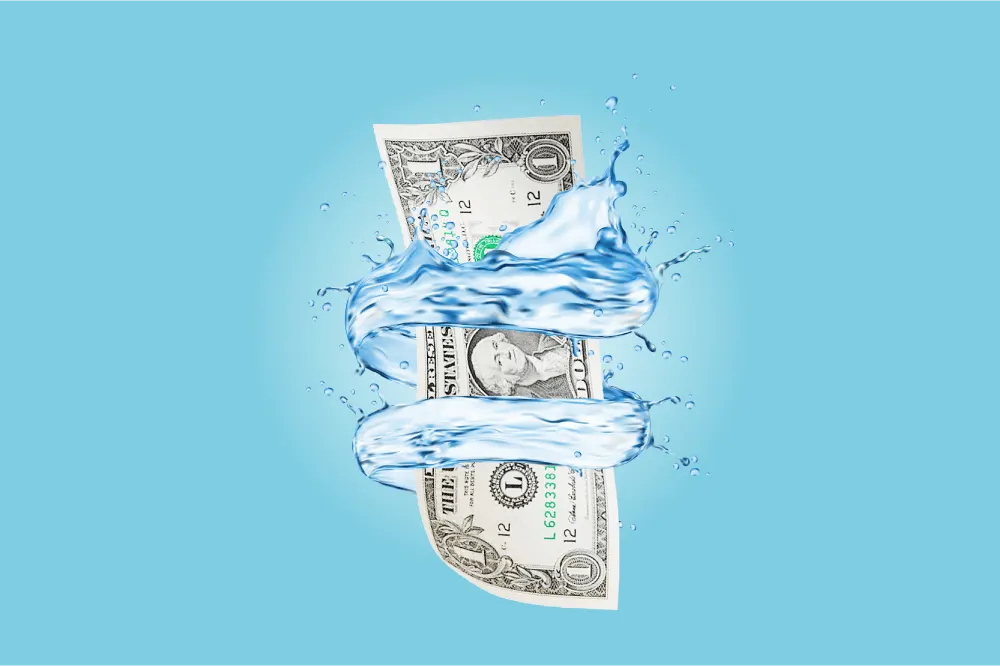Our partner, XM, lets you access a free demo account to apply your knowledge.
No hidden costs, no tricks.

Investing in water-related assets is gaining momentum globally. While many people might not have thought about it this way, fresh water is a commodity and as with any publicly traded commodity, retail and institutional traders can greatly benefit from investing in it. This is a growing market that is destined to make you huge returns, as water scarcity is increasingly affecting the global population.

There are a couple of great reasons to explain why investing in water makes sense. Our blue planet is full of water as around 70% of the earth’s surface is covered with it. But you might be wondering why would anyone invest in something as abandoned as water.
Well, the tricky part is that only about 3% of the global water supply is fresh, and out of that 3%, we have access to just about 1% of it. Only this fresh water is useful for us in most cases as the water we drink is fresh, the plants we grow also need fresh water to grow, and all of our industries (factories, mining, electricity generation, farming, etc.) uses fresh water to function. Seawater is too salty to use effectively. Some countries that are short of fresh water are building desalination plants, but the process is energy intensive and increases the price of the commodity.
What’s more, climate change is affecting rainwater distribution around the globe. Dry and hot areas are getting less rain, while other parts of the world are getting flooded.
One more thing that contributes to water scarcity is pollution. Plastic waste and chemicals coming from factories and the agricultural industry are damaging the freshwater reserves. Modern agriculture relies heavily on the use of pesticides and herbicides. These dangerous chemicals stay in the environment for a long time and can make fresh water undrinkable.
Demand for fresh water is increasing as the population grows and living standards rise. Food production, lawn irrigation, swimming pools, and many other factors are creating a heavy demand for water.
As it’s been said, necessity is the mother of invention. Where there are problems and scarcity, companies that are involved in solving these problems represent great investment opportunities.
There are a number of different types of assets to invest in when it comes to water.
Here’s a list of the asset types:
On the stock exchanges, you can buy shares of companies that produce pumps, filters, pipes, and other water-related equipment, or you can invest in water utility companies.
Moreover, you can find tech companies that are developing ways to desalinate seawater. The list of companies to invest in is endless. Let’s discuss some of the superstars to make choosing simpler.

American Water Works Company Inc. (AWK, NYSE) is the largest publicly traded water company in the US. The firm operates in 14 US states and serves more than 3.4 million customers. The company’s net income is increasing every year. From 2009 to 2020, the net income gradually increased from $233 million to $709 million. As for 2021, the number has reached $1.26 billion. The company has been growing steadily, and the stock prices have been bullish.
However, it’s difficult to say where the price will be at the end of this year as stock markets are expecting a recession and are pretty bearish at this point.
"Our business model is we are a regulated utility, similar to electrics and gas, we are regulated by state public service commission's, we invest the money ourselves, we have excellent access to capital markets. American Water's S&P A credit rated." - Susan Story
Keep in mind that bearish markets can create great investment opportunities for newcomers. Long-term investors buy stocks when they are down and sell them when they’re up. On the other hand, guessing where the bottom is can be a difficult job and is not recommended for novice traders. On many occasions, investors have bought deep, but the prices kept dipping. Whether you base your entry decisions on technical or fundamental analyses, markets always come with a certain degree of risk.
Another superstar company in the water business is Essential Utilities Inc. (WTRG, NYSE). Essential Utilities Inc. provides utility services to about 3 million clients and wastewater services to more than 250 000 people in the USA. It employs more than 3000 people and has a market cap of $10.85 billion.
AWK, WTRG, and other top water companies' stocks are popular and liquid. Liquidity is a very important subject when it comes to stock trading. High liquidity for short-term speculators is essential for providing inexpensive entry/exit prices. Low liquidity markets are characterized by high spreads. As for long-term investors, highly liquid stocks can indicate high interest in the company.
"Our first year as a water, wastewater, and natural gas utility, we've built upon the strong ESG Foundation of both organizations to make incredible progress toward our goals, but we've not been complacent in our success, and in fact, have publicly reported new aggressive targets across our business to become a more sustainable and more equitable company" - Chris Franklin
As mentioned above, high liquidity is important in the world of stock trading as it lowers trading fees and provides a basis for market moves. US stock markets offer the most liquidity and are preferred by many investors.
Let’s see additional top US water companies:
Moreover, you can invest in water indices. Indices measure the performance of certain publicly traded companies. For example, S&P Global Water Index consists of 50 water companies that are publicly traded and all of them have high quality.
Here are some of the most popular water indices:
Keeping an eye on water indices might help you improve your trading results even when you aren’t actively investing in them. Indices can be used as a measure of the health of the industry and indicators of the stock market.
In addition, Chicago Mercantile Exchange (CME) allows you to invest in different kinds of futures, including water, energy, metals, real estate, currency, and more.
Beverage companies are huge consumers of freshwater. Coca-cola, Starbucks, Heineken, PepsiCo, and Carlsberg are just some of these beverage companies that are publicly traded.

Coca-cola is a giant, with a $256.85 billion market cap. Its stocks are traded on the New York Stock Exchange, and the company offers a 2.97% dividend yield to its shareholders.
There are two ways shareholders can make money in the markets:
It should be noted that not all companies are offering dividends and the amounts vary from company to company. Dividends can be a very important point if you’re looking for a company for long-term investing.
The largest beverage company in the world is Chinese firm Kweichow Moutai with a market cap of $365 billion. What makes this company unique is that it’s partially owned by the Chinese Communist Party (CCP) and partially traded on the Shanghai stock exchange.
Making water-related investments might be challenging for most. Like any other traded commodity, water investing has its risks and rewards.
The first thing to determine is whether you’re a long-term investor or a short-term speculator. Long-term investors base their decisions on mostly fundamentals, while short-term speculators mostly use technical analysis.
Fundamental analysis consists of understanding real-world supply and demand challenges, making sense of political decisions, and evaluating competing companies.

The technical analysis simply means studying the markets using chart patterns and technical indicators. Speculators base their predictions on historical performance and patterns that appear in the market. Some investors use both techniques in their decision-making process.
Your investments can be influenced by the overall health of the economy. Water indices, supply and demand issues, earnings of the companies, government decisions, and more.
Furthermore, high exposure can be an additional risk. Many investors spread their funds among different industries to protect themselves from losing everything when some predictions fail. As of today, investing in water-related industries makes a lot of sense, but what happens if there is a new scientific development of effectively distilling seawater?
Our partner, XM, lets you access a free demo account to apply your knowledge.
No hidden costs, no tricks.
Fresh water is a limited resource, and it makes perfect sense to invest in something that’s scarce. Climate change, increased consumption, and pollution make water-related investments attractive.
You can invest in water-related companies such as utility, tech, waste management, and more. However, keep in mind that the more liquid the stock, the better. Apart from stocks, you can invest in water indices and futures.
Inflation eats savings and only through investing it is possible to save or increase the value of your funds. However, choosing where and how much to invest is the more difficult question.